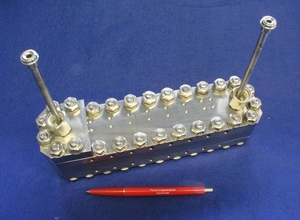New efficient processes and compact equipment will be necessary for the conversion and use of small natural gas resources from remote areas as well as for biomass utilisation. These technologies, will allow economic storage and transport of valuable products with high specific energy density.
Furthermore, biomass plants should fit to the landscape by limiting the plant dimension. Natural gas, obtained from oil platforms as byproduct of oil production, should not be burned to minimize the greenhouse effect as usually done (Methane has a greenhouse effect 20 times higher than the CO2, which is generated in course of the combustion).
Microreactors create an ideal situation for removing mass and heat transport limitations in synthesis reactions for production of useful fuels or chemicals.
Having in mind a production range of chemicals from several 100m³/h syngas, the Institute of Micro Process Engineering is focused on topics of catalyst integration into micro-reactors, optimization of reaction conditions as well as scaling up reactors from laboratory to a pilot plant size.
Concerning direct DME synthesis, bi-functional catalysts are designed to optimize reaction conditions. On such hybrid catalysts, syngas will be converted into methanol and immediately converted to DME by methanol dehydration. The reaction kinetics can be improved by further approximation of both catalyst functions in the hybrid catalyst.
 Laboratory reactor for DME direct synthesis for development of the bi-functional catalyst
Laboratory reactor for DME direct synthesis for development of the bi-functional catalyst